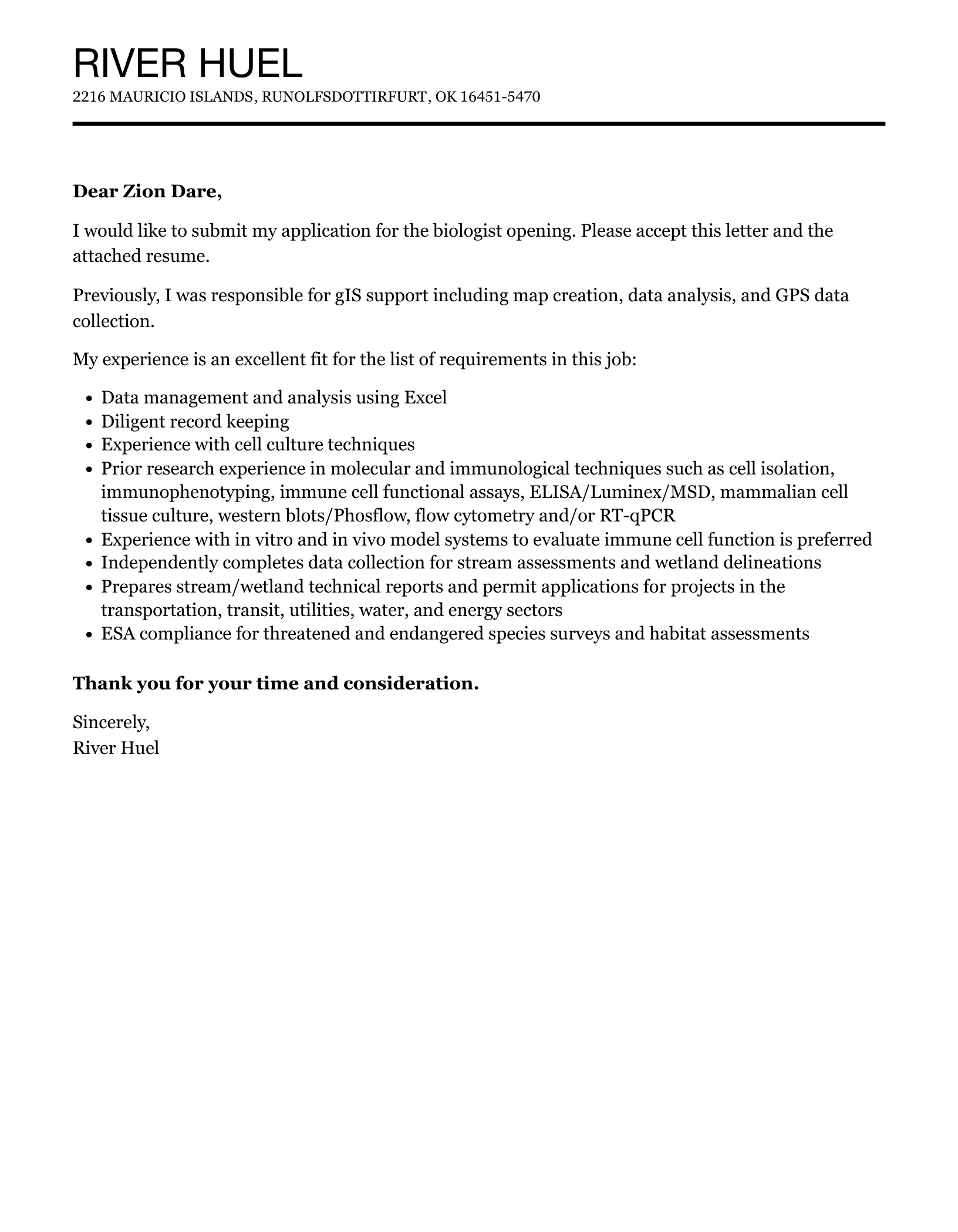A compelling cover letter is your first opportunity to make a lasting impression on a potential employer. For wildlife biologists, this document is crucial for showcasing your skills, experience, and passion for the field. A well-crafted cover letter can significantly increase your chances of securing an interview and ultimately, landing your dream job. This guide provides the top five tips to help you write a standout wildlife biologist cover letter that captures the attention of hiring managers.
Highlight Your Skills
Your cover letter should function as a highlight reel of your relevant skills. While your resume provides a comprehensive overview, the cover letter allows you to elaborate on specific skills and provide context. Don’t just list your skills; demonstrate how you’ve applied them in previous roles or projects. This is your chance to show, not just tell, what you can bring to the table. Focus on skills that align with the job description, and make sure to provide concrete examples of your accomplishments.
Relevant Skills for Wildlife Biologists
Wildlife biology is a diverse field, and employers look for a range of skills. Your cover letter should address the specific skills most relevant to the position. Consider the job description and tailor your letter to highlight the skills they value most. These can include both hard skills, such as data analysis and field techniques, and soft skills, like communication and teamwork. Be sure to include examples demonstrating your proficiency in these areas to make your application stand out.
Research and Communication Skills
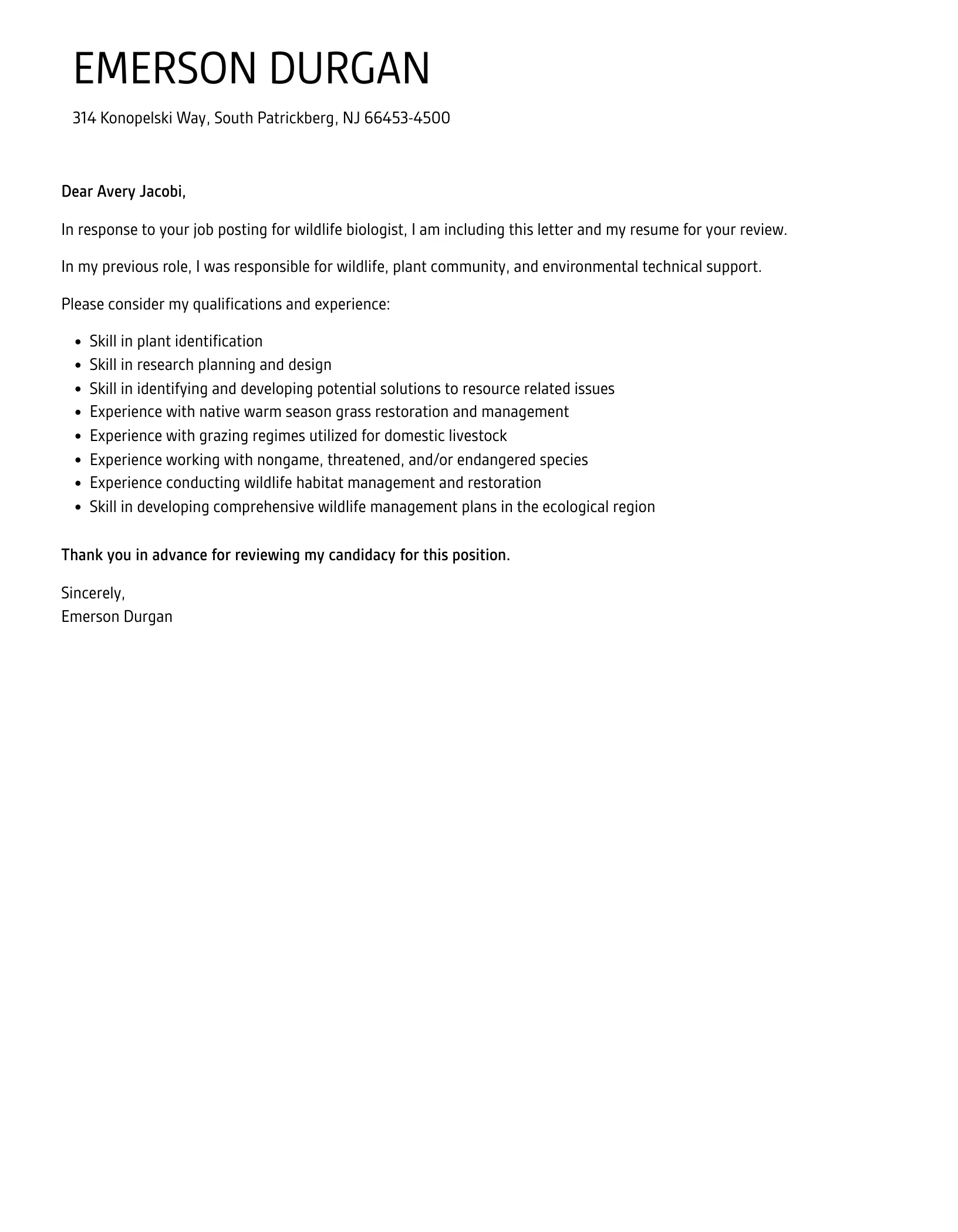
Research and communication skills are essential for wildlife biologists. In your cover letter, emphasize your ability to conduct thorough research, analyze data, and present findings effectively. Showcase your experience writing reports, scientific papers, or grant proposals. Highlight any presentations you’ve given or any public speaking experience. Strong communication skills are critical for collaborating with colleagues, communicating with stakeholders, and educating the public about wildlife conservation efforts.
Technical Skills
Technical skills are increasingly important in wildlife biology. Include any software proficiencies, such as GIS, statistical analysis software, or database management systems. Mention any experience with specific field techniques, such as animal trapping, tagging, or telemetry. If you have experience with specific equipment, such as GPS devices or remote sensing tools, make sure to include that as well. Emphasizing your technical skills will demonstrate your readiness to perform the job duties effectively.
Emphasize Your Passion
Your passion for wildlife biology should shine through in your cover letter. This is more than just a job; it’s a calling for many professionals. Convey your genuine interest in wildlife conservation, habitat preservation, or species research. Share what motivates you and what specific aspects of wildlife biology you’re most passionate about. This demonstrates your commitment and makes you a more appealing candidate to employers who are looking for enthusiastic individuals who truly care about their work.
Demonstrate Experience
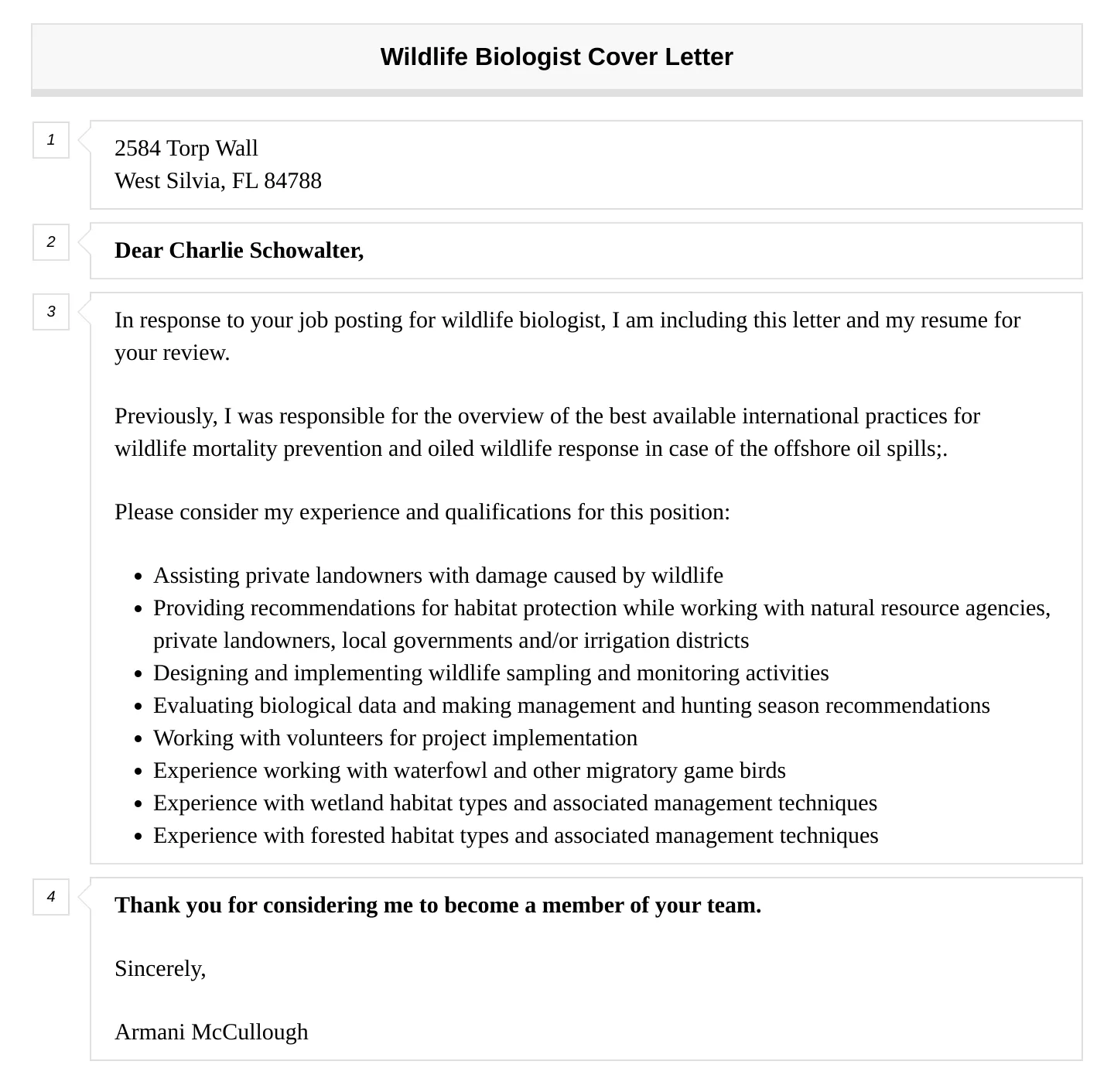
Your cover letter is your opportunity to provide context for your experience. Don’t just list your previous roles and responsibilities; explain what you accomplished in each position. Go beyond simply stating your job duties by focusing on your achievements and the impact you made. Use the cover letter to highlight any special projects, unique challenges you overcame, or any notable results you achieved in previous roles. Providing these specific details will give a better impression of what you can bring to the table.
Quantify Your Achievements
Whenever possible, quantify your achievements. Use numbers and data to demonstrate your impact. For example, instead of saying you ‘managed’ a project, state that you ‘managed a project that resulted in a 20% increase in species population.’ This approach makes your accomplishments more concrete and helps employers understand your value. By using numbers, you’re proving the positive results of your efforts and showing that you understand how to measure and assess the impact of your work.
Showcase Project Successes
Highlight any project successes you’ve been involved in. This is a great opportunity to demonstrate your ability to manage projects, collaborate with teams, and deliver results. Describe the scope of the project, your role, and the outcomes. Did you contribute to a successful conservation effort? Did you improve a habitat? Were you involved in a scientific discovery? Provide specific details about your contribution and the positive impact of the project. This showcases your ability to be successful.
Tailor to the Job Description
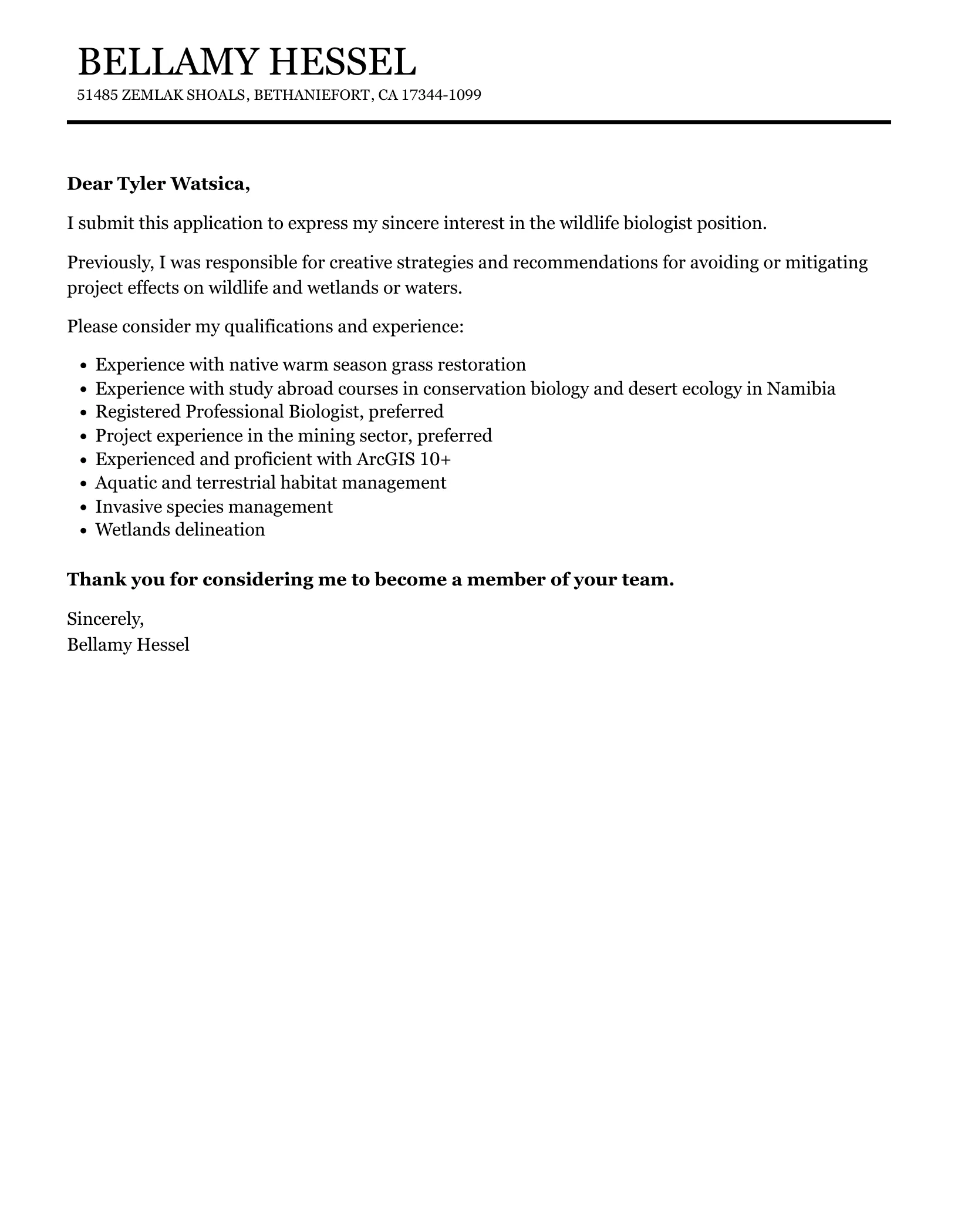
A generic cover letter will likely end up in the rejection pile. Always tailor your cover letter to the specific job you’re applying for. Review the job description carefully and identify the key skills and qualifications that the employer is looking for. Adjust your cover letter to specifically address these requirements. This shows that you’ve done your homework and that you understand the needs of the position and the company.
Keywords and Phrases
Use keywords and phrases from the job description in your cover letter. This helps applicant tracking systems (ATS) identify your application as a good fit. It also shows the hiring manager that you understand the requirements of the position. Integrate these keywords naturally into your writing. This will also help you to create a cover letter that is clear, concise, and aligned with the employer’s needs. Read the job description several times to make sure you don’t miss important details.
Company Research
Before you write your cover letter, do some research on the company. Understand their mission, values, and the types of projects they work on. This will help you tailor your letter to their specific needs and demonstrate your interest in their organization. In the cover letter, reference specific projects or initiatives of the company. This proves you have a genuine interest in working for them and understand what the company is all about. This will help you to get a job.
Proofread and Edit
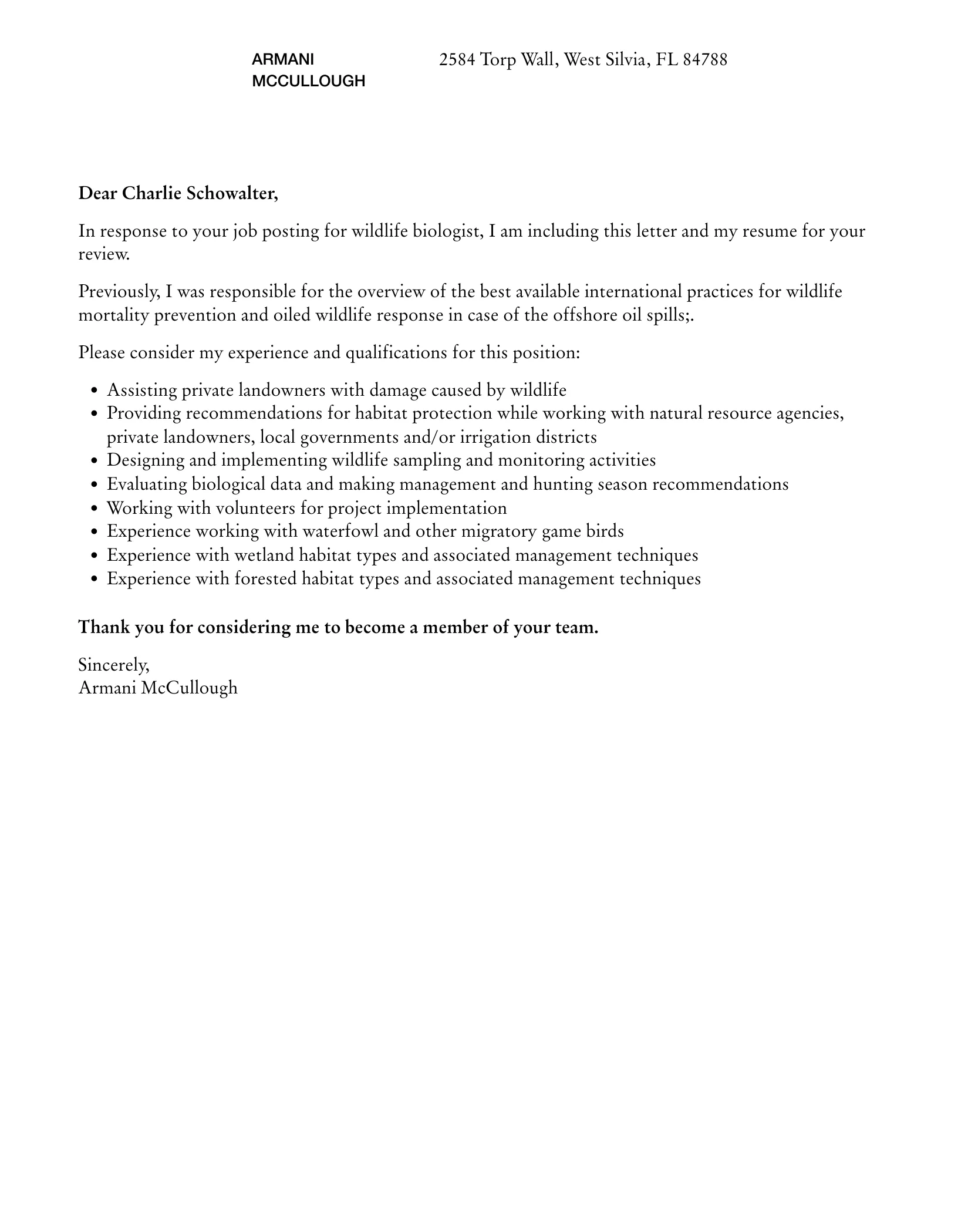
Before submitting your cover letter, proofread it carefully for any errors in grammar, spelling, and punctuation. A well-written cover letter demonstrates your attention to detail and professionalism. Mistakes can create a negative impression. Get a fresh pair of eyes to review your cover letter. Ask a friend, family member, or career advisor to read it over and provide feedback. Having someone else review it can help catch errors you may have missed.
By following these five tips, you can create a wildlife biologist cover letter that stands out from the competition and increases your chances of landing an interview. Remember to highlight your skills, demonstrate your experience, express your passion, tailor your letter to each job, and proofread carefully. Good luck with your job search!
